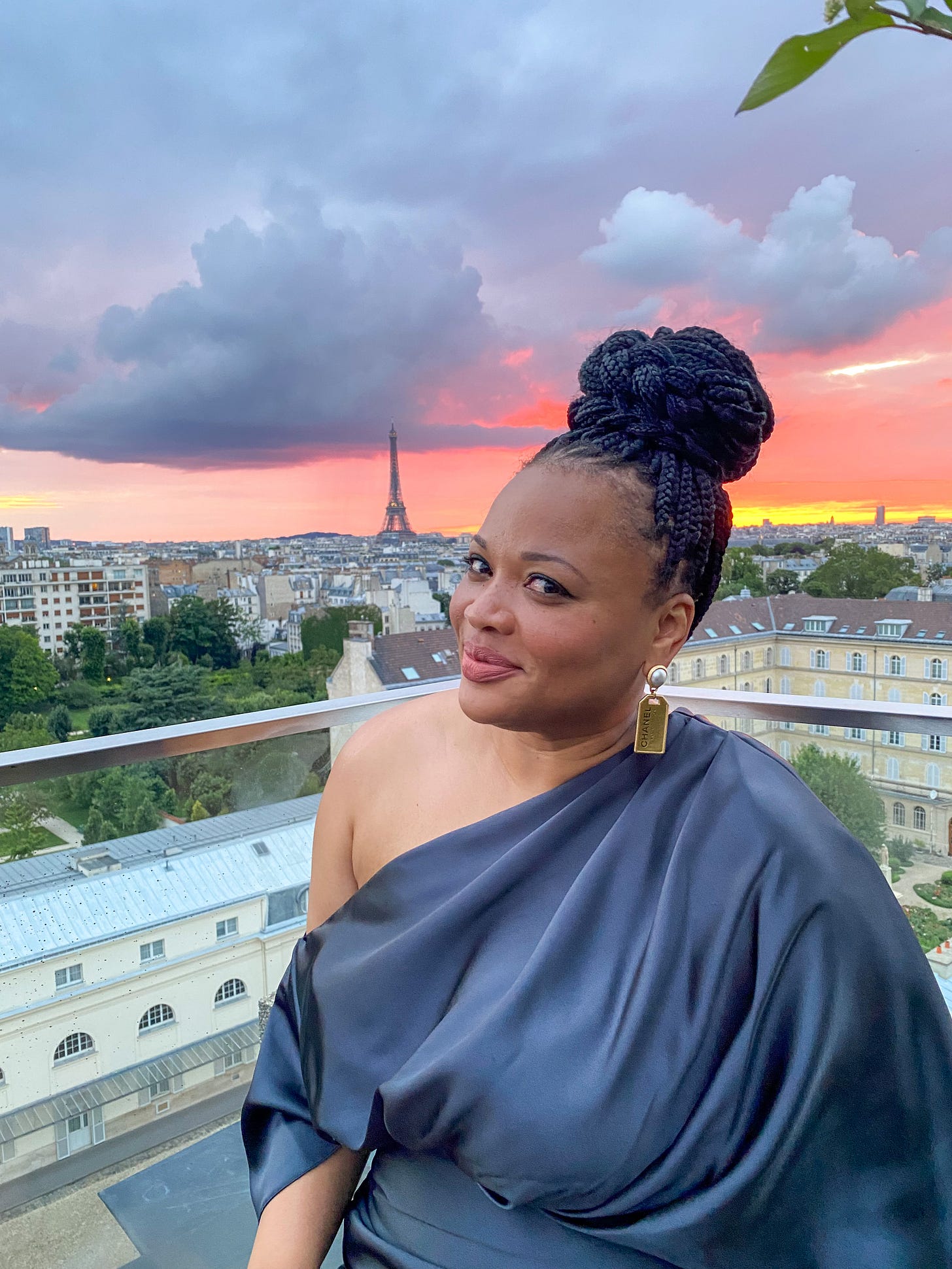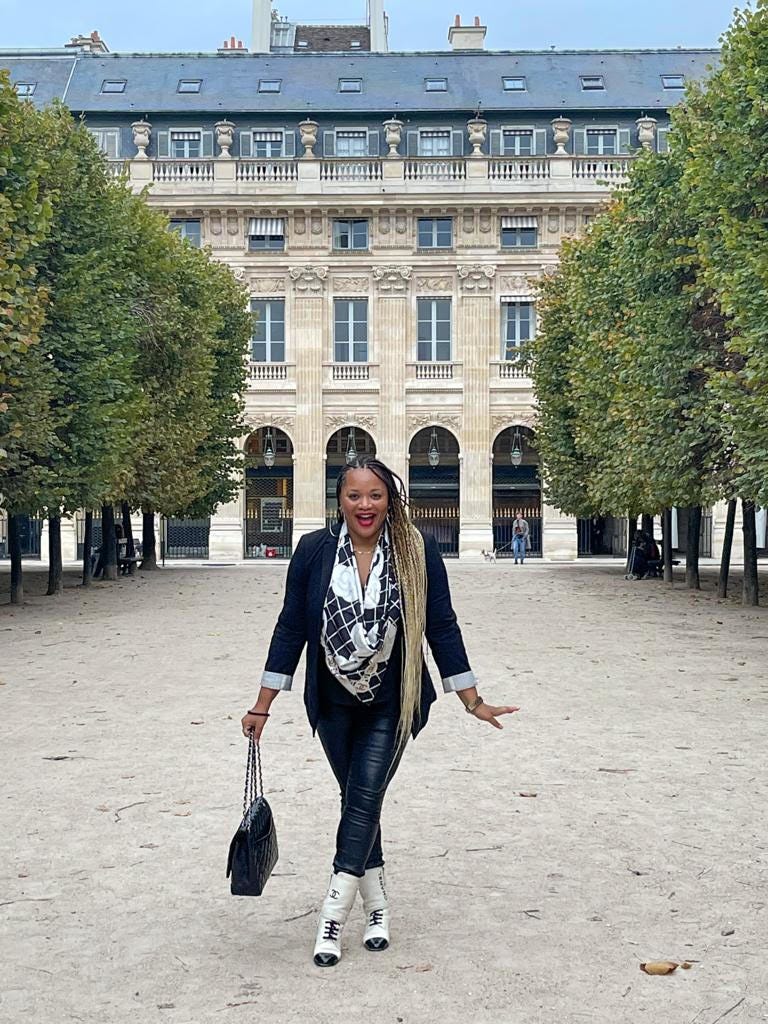What drives Americans to leave home and settle elsewhere? That question has been on my mind for many years. This series, Leaving America, seeks to uncover the multitude of reasons and lessons learned—beginning with Americans in and around Paris. Become a paid subscriber to access this newsletter’s archives.
What happens when you’ve spent more than a decade in an adopted home, decide to start splitting time in the U.S. to be closer to loved ones, and homeland turmoil shifts everything? Latrice Darlène Shepherd, a former English teacher who now focuses full-time on her luxury shopping concierge business and consulting American women, particularly Black women, on establishing residency in Paris (and thriving once they arrive), is currently experiencing that very existential crisis. Below, the creator of Paris Chic Code shares her highs, lows, and current uncertainties.
Where was the last place you lived in the U.S.?
New York City.
Did you intend to leave permanently or was the move temporary?
I intended to move for 6 months to a year. When I first arrived in Paris, I sourced a teaching gig on Craigslist—remember them? I taught conversational English classes for €400 a month, if you can believe that. That little side hustle eventually became a full-time cadre CDI (full-time contract) at a Grande École. It took me nearly two years to earn that CDI. I started working under the table, then graduated to a CDD (temporary contract), and finally secured the stability of a CDI with the same company. I stayed with them for eight years.
Was there a pivotal moment when you knew your life would be best pursued elsewhere?
There wasn’t one defining moment. But after spending a year in Paris, studying French and working, I realized my life felt lighter than the constant grind of New York. Growing up in the Bay Area, I had been sheltered inside a liberal bubble. Moving to New York exposed me to harsh realities—stark inequality, classism, and the sharp divide between the haves and the have-nots. Paris gave me a different kind of ease.
What sort of financial consideration did the move require, even if as a student initially? Does one need a plump savings account to make this work?
I had nothing saved, and I still made it work. I figured it out along the way. For my clients, I always stress that it depends on their lifestyle. When I moved to Paris at 33, finishing my degree, I didn’t need much. Now, at 45, my needs and standards are higher, so I would approach it differently. But the truth is: moving to Paris is absolutely possible without a massive savings account.
At what age did you leave? Looking back, was that too soon or too late?
I moved at 33. In hindsight, I wish I had shifted my timeline earlier. I should have moved to New York at 21 instead of 28, Paris at 30 instead of 33, and back to the States part-time at 40 instead of 44.
When did you know you'd made the right [or wrong] call?
I knew I had made the right call when I recognized the privilege I carried as a Black American woman in France. For the first time in my life, I was simply an American—not a hyphenated Black American. In France, I experience the same global privileges afforded to white women. I can just be. I can take up space unapologetically. I also recognize, though, that my experience as a Black American woman is not the same as that of Black French women, who do not enjoy the same privileges.
What does Paris offer you that your native home couldn’t and, perhaps, still can’t?
Everything I mentioned above, plus: job security, universal healthcare, six weeks of vacation, and the South of France.
Can you share any anecdotes about your highest and lowest moments in Paris?
My highest moments have come through my work as a personal shopper—being invited to exclusive events and treated with a level of respect and privilege that comes with a cost in the States. Walking into luxury boutiques, restaurants, or cafés, the red carpet is often rolled out for me. Once, while shopping with a client, she pointed out how respected I was everywhere we went. She was right—it’s a different reality. In the U.S., Black Americans are too often dismissed, ignored, or treated as nuisances.
About five years into my life in Paris, fresh from a breakup with the man I thought I would marry, I created Penniless in Paris. It was a blog about finding my footing in the City of Light, highlighting my single life and my attempts to figure it all out. During those early years, one of my biggest mistakes was not building a network for myself. All of my friends were my partner’s friends, and when the relationship ended, so did those friendships. Not creating my own community remains one of my biggest regrets. I’m an extrovert; meeting people comes easily to me, but back then, I failed to do it until I had no choice. So some of my lowest moments were the times I felt the loneliness of Paris, without my family or the close friends who ground me.
Are there aspects of American life that you long for?
Black Americanness. Black women. The Black church. My family. Life abroad can be deeply lonely. While I have an American community in France, I need the presence of Black Americans. I can’t do life without them.




